Build A Fortress
With fellow South Londoner Katie Beswick, Kate Tempest discusses gender identity, her compulsion to tell a story and her love for her corner of the city
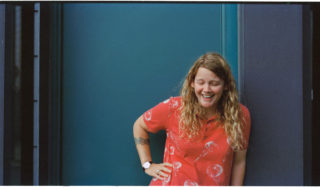
With fellow South Londoner Katie Beswick, Kate Tempest discusses gender identity, her compulsion to tell a story and her love for her corner of the city
When Kate Tempest performed Brand New Ancients at the Battersea Arts Centre in 2012 it heralded a new dawn in the poetry, music and playwriting career she had been building for over a decade. Though already an established figure on the spoken word scene, where she had been honing her prowess as an MC since her teens, the epic poem catapulted Tempest to the mainstream and won her serious literary and critical attention (including the Ted Hughes Prize for New Work in Poetry the following year). Combining spoken word with a four-piece orchestral score, Ancients was a portrait of South East London’s streets: a delicate tapestry of intersecting narratives that illuminated an overlooked London district. It drew on ancient Greek mythology to position a very contemporary world within the context of human history. The characters in her poem were drawn with such truth and sensitivity that listening to the work was almost painful.
Tempest’s extreme, stripped-bare vulnerability as a performer gives her an incredible ability to connect with an audience. The emotional voltage of her performance in Brand New Ancients was such that, after I saw it, I sat stunned. I stayed glued to my seat in the auditorium until an usher asked me to leave; tears wet on my face, totally wrung out — as if she had pulled at the threads of some sadness twisted up inside me. I’ve been slightly obsessed with her ever since, following her ascent into the music and literary elite with serious awe and not a little envy. I think part of my fascination with her work stems from the fact that, like Tempest, I was born and raised in South East London and my sense of identity is profoundly connected to my home.
Four years later and, surreally, I’m sat with Kate Tempest in our native South East London, shielding the sun from my eyes as we discuss her work. “Yeah,” she says, when I mention the impact Ancients had on her reputation, credibility and mainstream appeal. “Brand New Ancients was a bit of a benchmark because it was a turning point in terms of recognition and in terms of completing a big idea. It was the first time I’d really had an idea, seen it through, got to the end of it.”
As it has become apparent, it was just the start of Kate Tempest’s big ideas. She’s spent the past few years working prolifically: producing an impressive body of work including a poetry collection (Hold Your Own), three plays (Wasted and Hopelessly Devoted for Paines Plough, and The Glasshouse for Cardboard Citizens), a Mercury Award Nominated album (2014’s ‘Everybody Down’ 2014), a novel (The Bricks that Built the Houses) and now, another album, ‘Let Them Eat Chaos’, which will be released this coming month.
I’m quite nervous about our meeting. Despite her vulnerable, compelling stage persona the intimidating volume and force of her work and her well-documented disdain for “industry slime balls,” as she refers to the sycophantic hangers-on in ‘Everybody Down’, mean I am half-anticipating a tetchy interview subject. But she’s great company: honest and open, intense, yes, but kind and articulate too. And while she is uncomfortable with the necessary media attention that comes with a successful music career, she is obviously pleased to be putting her latest record into the world. “I wasn’t really looking forward to this,” she says, looking over her shoulder before heading into our photo-shoot, “but then I remembered this is the first time I’ll be talking about the new album with a British journalist, and I got a bit excited.”
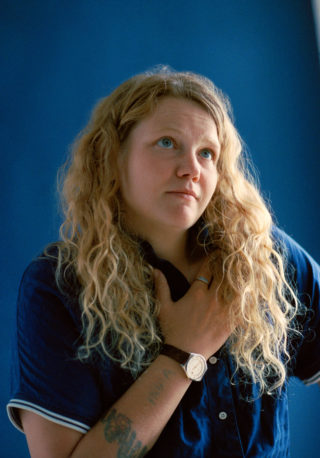
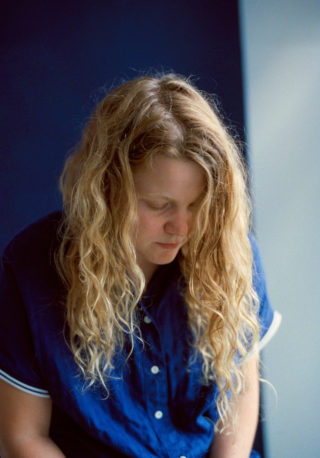
Reading a list of her recent accomplishments, it’s easy to assume that Tempest’s success has been effortless. From the outside it is baffling that a person could produce such an impressive oeuvre in less than five years. Yet she emphasises that her achievements are hard won, telling me that her prodigious work ethic is borne partly from a need to prove her talents outside of the industry hype about her work. “I’ve been doing this for a long time,” she explains, smoothing out the collar on her Fred Perry shirt and shifting sideways in her seat, trying to escape the glare of the sun. “The plan was always to build this foundation. Build this base that’s so strong nobody can question your integrity. Because as soon as you read about someone in a magazine you think you’re being sold something. It’s the hard sell. So you don’t trust it. You don’t trust that this artist you’re reading about is worth anything. Because you haven’t discovered this artist yourself, it’s being thrown at you by the powers that be. You’re just looking at a picture of someone feeling really uncomfortable, probably, in a photo-shoot feeling like a dick, and then you’re reading an article. And the thing is, what I wanted to do always was build this fortress. It’s three plays, two epic poems, a novel. It’s three albums. You can’t argue with that. That’s like: she’s serious.”
She leans forward, presses her palms into the table. “And ever since I was a kid, and I’d come into the rave or the cypher or whatever, people would be like, ‘What are you doing here?’ And I would start rapping and it was like: ‘Oh. She’s serious.’ Like, for a woman especially, it’s a very interesting feeling to have to prove that, actually, you’re serious. And I’ve been trying to prove that all my life and I think I’ll be continuing to try and prove that forever.”
We meet in Brockley, a place Tempest once described in an interview with The Guardian as ‘a bit shit and […] never going to be anything other than a bit shit.’ It’s strange, reading that now, because South East London is not the place it was four years ago; certainly not the place it was fifteen years ago, when Kate Tempest was a teenager just beginning her creative journey. The signs of change, of money — of gentrification for want of a better expression — are immediately visible: I step off at the station and walk straight onto a small side-street dotted with organic cafés and up-market coffee shops; all gluten free bread and fair trade coffee. The crumbling pubs and greasy spoon caffs of my youth are gone. A man in an expensive suit sits at a stripped pine table; tapping at his MacBook Air, sipping freshly squeezed fruit juice from an elegant glass. It is unrecognisable from the place I once knew — although the empty crisp packets that catch on the wind as I make my way to Jenna the photographers’ studio remind me that home is still there, dirty and familiar, under the surface of this shiny new city.
Kate’s voice is another familiar marker of home — her accent is just like mine and the women I grew up with — with the glottal stops, and the way she peppers her sentences with fucking swear words. We spend a bit of time reminiscing about the old South East London, the speed at which it has changed; how it’s much safer now, but that nagging sense of loss tugs at you nonetheless. Tempest nods. “It’s interesting like, to talk to you,” she says. “Someone who’s from round here. It’s like if you’re not from here you might think this is an affectation. Trying to make out that London’s a hard place or whatever. But there is a sensibility it gives you where, it’s just, life is really full on.” She shakes her head. “But, you know, I think there’s a lot to be said for, just, for example: when I walk down the street in New Cross I know exactly where every single turning off leads to. I know exactly what’s down there. And there’s something instinctive about walking the same roads that you and all your younger selves have walked, thirty years of my life. And all the things that I’ve seen and that has happened. I don’t even have to take that left: I know what’s down there. And for a long time that was extremely comforting and I wouldn’t really like the feeling of not knowing where a road goes when I’m in East London or North London or West London.” She looks around at the new development where we’re sitting. “I mean, lots of people really enjoy the feeling of adventure and discovery, but because I’m so rooted to my home I always felt a little bit not quite safe when I was out of my area. But now, because it’s changed so much, it’s not quite the same thing. I don’t feel quite so entwined. But a lot of my pals are still here. It still feels mine. But that’s changing a bit.”
The changing face of our hometown, and the inevitability of change in general, is a central theme of ‘Let Them Eat Chaos’. On the track ‘Perfect Coffee’ Tempest offers an open lament to a neighbourhood lost to flash developments and corporate interests (‘It don’t feel like home no more/I don’t speak the lingo/Since when was this a winery/It used to be the bingo’). But the album is not just about slagging off expensive housing developments; it’s more complex and interesting than that, using detailed descriptions of the South East London locations (‘Up the stairwell/Chip-fat grey and London green with damp/Out on the fifth floor/where the wind grips your jaw and holds you in its clamp/There’s a red door bordered by mottled glass/And inside/A lighted lamp’) to give way to reflections on the world at large: on politics, war, the environment; on love and intimacy.
The track ‘Europe is Lost’ appears at first a direct comment on Brexit and the politics that surround it (‘And about them immigrants I can’t stand them/Mostly I mind my own business/But they’re only coming over here to get rich, it’s a sickness/England, England, Patriotism/And you wonder why kids want to die for religion’). But Tempest tells me she wrote the track long before the referendum. “I wrote it in, like, November last year,” she says, “just before the Paris attacks. But the thing is it’s like you can see it. It’s all been coming for a long time.” If the artist sometimes seems like a mystic, she says, it’s just because they’re noticing what’s happening in the world.
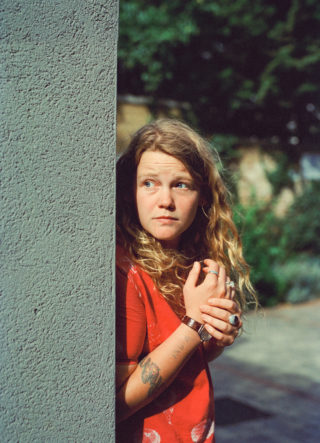
“I did an interview with Don DeLillo recently, for Picador. He’s a novelist who I think’s amazing, and he just wrote a book. And lots of people talk about how in Don DeLillo’s work he’s been like prescient, he’s seen the future or whatever, and when reading him, I thought that rather than being prescient he is just extremely present. He’s just noticing. He’s looking around and just noticing the things we take for granted every day. He’s looking and describing the kind of surreal, bizarre, strange, just hysterical nature of everyday life. But because he then writes it down it suddenly seems like the future. So I kind of feel with something like ‘Europe is Lost’, it’s just happening. I just noticed it and then Brexit happened and now, suddenly, it seems like it was a comment on that.”
Would you mind it being understood as a comment on that, I ask.
She shakes her head. “Once the thing’s written it’s got nothing to do with you. That’s the thing. It doesn’t belong to me. So whatever people take it for. You’re not looking for those moments [of wider meaning] when you write. You know, all being well, it’s got nothing to do with you. You spend your whole life trying to accommodate the ideas when they come. Improving your facilities, learning your flow, learning your craft. But when the idea comes it’s not you that has it. You just have to deal with it when it comes.”
‘Let Them Eat Chaos’ is a series of connected songs that unfolds around the stories of seven characters in seven homes, the only people awake at 4.18am on a stormy night. Though the lyrics are unbearably bleak, the backing instrumentals (produced by Dan Carey) are upbeat and buoyant; the music feels as if it is a celebration of the terrible reality Tempest is compelled to narrate. In its epic nature and overarching humanist themes, this new record is very much like Brand New Ancients. But although it is character driven, ‘Let Them Eat Chaos’ also feels incredibly personal, autobiographical in places. It bleeds into and out of real life as Tempest experiments with blending the story-telling form she has developed in her more recent work with the rawer aesthetic from her earlier rapping days, which she has sometimes called ‘shouting at people.’
“I suppose all characters begin in a moment of truth or a moment of lived experience,” she says, when I ask her whether she deliberately meshed the personal and the fictional in writing ‘Let Them Eat Chaos’. “Whether that’s your own or somebody that you know and love. So there are moments, yeah, there are moments of autobiographical stuff. But it’s the compulsion to tell. It’s a strange thing that poets and rappers have – this kind of compulsion to speak truth or tell secret things that want to be heard. It’s a really strange, like, grip that it has you in. But then it’s important to me, or it was important to me with this record, that it wasn’t just about me, or the narrative ‘I’. That it reaches out, that it’s about people who are not just facets of my personality. Who are characters. I did some work on trying to make them characters.” She hesitates. “I hope they feel like characters.”
They do.
“And in the end, through these very specific descriptions of the environment, I want people to be able to locate themselves in it, you know?”
Tempest and her band have already started performing the album locally. She tells me that one of the reasons she’s still based in South East London is because the people here understand her journey. “I really like being around people that know how long I’ve been working on this,” she says. “Because there’s nothing sycophantic about their respect. Or in fact their lack of respect.” The first gig at her local pub, The Bird’s Nest, went, erm, well. “It was pretty fucking mental,” she laughs. “It was half one in the morning on bank holiday weekend. Everyone was fucked. It was like trying to do a play fucked. So weird. But we did another one earlier on in the night the next day, in Brixton at this pub [The Windmill]. And somebody said they left the gig and they were walking home, and they were looking at the windows and they were like, ‘Who’s in there? Are they awake? What are they doing?’ And this is the beautiful thing I think about storytelling: it’s that – whether it’s film, or music, or fiction or whatever – it’s that suddenly it positions you more fully in life. Suddenly you’re looking at people being like, ‘oh my God, you’re everything.’ And the whole point of my work is look again.”
Looking again at Tempest’s body of work, one of the things I notice is the progression of her narratives in terms of gender fluidity and homosexual themes. In ‘Let Them Eat Chaos’ female characters are openly attracted to other women, and the love interest in her novel, Harry, who had been male when Tempest told a version of the story on ‘Everybody Down’, became a woman in the book. This marks a real shift from her earlier writing, which although always exciting in terms of its experiments with form, often worked with familiar heteronormative narrative tropes. The conservative heterosexuality, of Brand New Ancients and ‘Everybody Down’ particularly, seemed a little incongruous given that Tempest herself is a female rapper with an awkward, boyish presence – an image completely out of step with stereotypical understandings of femininity.
She tells me that the path towards non-conventional gender roles in her work has been tough, especially because writing heterosexual males was a way to escape from the uneasiness she felt about her own gender identity in her earlier years. “I have my own particular experiences of gender and feeling a little uncomfortable with where I sat, extremely uncomfortable when I was younger,” she says, “And music – hip hop, lyricism – being a way out of all of the things that didn’t work about me, do you know what I mean? So my work has been this holy grail that allowed me for a moment to step outside of all the things about my identity, including my gender, that I was judged for, or because of, or that I needed to escape for a minute cos it did my head in. And a lot of the storytelling and stuff was I suppose a way for me not to have to discuss ‘I’ being ‘she’, you know? It was easier for me to write a male character, because I could identify more with one.”

She pauses for a moment, contemplating; the faint, fine lines around her eyes and lips illuminated by the early evening sun, her long hair golden on her shoulders. “But as I’ve got older, I feel very close to my femininity actually; in a way that’s very personal and not really bound up with ideas about femininity that are inherited from other sources. I feel like my poetry, my performance – especially my performance – connects me so deeply with my creative energy: my raw, very female self. Which is extremely vulnerable but so strong. And I feel much more comfortable on that stage going there than I ever feel talking to people, or being patronised, being condescended to, being undervalued. These are all the things that I associate with being a woman.”
Writing female characters, she acknowledges, is hard. Partly because of the limited ways women are presented in music, literature and art more widely, and partly because she is aware that an explicit, forced gender politics might dilute the potency of her work. “When you begin writing a woman character you have to work really, really hard to give her agency, space, depth. You have to make a fair start on your journey before you can start fighting the inherited conventional clichés that you are party to, in terms of just conceiving narrative. Like Becky [the protagonist in The Bricks that Built the Houses/Everybody Down] I had to work so hard, I had to do three or four drafts to make her not passive. And she’s not meant to be passive – I mean,” she gestures towards me, smiling, “I’ve never even met one! I’ve never met a passive woman. And here I am writing one. And then Harry, because Harry began life as male, just had all this kind of depth and intricacy and selfhood. And obviously I then rewrote the character because now she’s a woman and she’s got these different concerns, but it was a really interesting moment in being like: fucking hell. I’ve met a few women who absolutely blew my mind. Who were so inspiring and cool and queer and just fucking brilliant, and I just thought: ‘This needs to be. I need to write this woman – I really need to write her.’ And I was so fucking terrified about it. But actually nobody,” she bursts out laughing, “no one seems to have a problem with it! And this is what I’m talking about, the conventional traps, the narrative traps. You don’t even realise you’ve inherited this idea of the ‘she’ in the story, even in my own story.”
I think it’s important, I say, to write outside the conventional narratives, to make art that gives women more options. “I’ve had my battles with it, you know,” Tempest shrugs. “But also I don’t want every story I tell to be about two women. Because this is the thing as well: if you are too decisive about wanting to redress the gender balance within your narratives then it’s even worse. It’s even clumsier. But then it was quite nice that of the seven characters [in ‘Let them Eat Chaos’] five are women, and quite different women. One’s a mother. One’s a carer. One’s a professional older woman – that’s how I see Esther. Zoe, the one that’s packing her boxes, she’s a bit younger I see her in her early 20s.”
And we’re back to Tempest’s forensic obsession with her writing, that absolute commitment to an idea, to detail, to perfecting her characters. I wonder whether such a ferocious work ethic is entirely healthy, whether she feels like she might need to slow down at some point. “Yeah,” she nods. “Like, I mean, yeah. It’s pretty heavy, my workload. Like, it is knackering. I am knackered. There’re things I’m not able to do with my life. I can’t just fuck off. But I’ve been doing this a long time. And I’m extremely driven by something I can’t really articulate my relationship with; it’s a very huge part of my life, this constant service to an idea. Being able to improve my capabilities to accommodate the idea. This is all it is. Everything you write, as soon as you wrote it, it’s shit. The idea is perfect; the finished thing is shit. This is it. This is the agony of it. This is the journey. So I’ve got this debt to every day of my life I’ve spent doing this, since I decided I wanted this to be my life.”
Ever since she was fifteen, Tempest tells me, she’s been struggling to make the next move, to finance her artwork and get to a position where she can do justice to her ideas. But it hasn’t been a painless path. “It does get easier,” she insists. “Because you end up with things like a publisher and a manager. I’ve got a manager who’s really amazing and helps me. But for ages I was self-managed and it put huge, huge pressures on every relationship I had. Because I was just fucking absent. Mental. Stressed. And everything had to revolve around my work. I didn’t really see my family for ages. I was married; that kind of fell apart. It was like, fucking mental the things you have to do to get into a position where you can take yourself, take tomorrow, seriously.”
I find myself telling Kate about an artist friend of mine, who struggled with debilitating mental health problems that seemed connected to her need for validation from the art industry — although it’s clear that it’s not only external validation that drives Tempest’s ambition. Her deep need to connect with people, to experience the beauty of the world in all its colour and agony is obvious; the way she closes her eyes against the light when contemplating a question; the sincerity and clarity with which she speaks about her work. “The temperament that pushes you to make art is one of extreme sensitivity,” she says. “We’re so sensitive. We’re tuned into life on this frequency that is almost unbearably poignant. Things are devastating and perfect. And yes, validation is a huge part of it, because you’re so raw. You’re so open. And then you give your whole life to making this stuff and if nobody wants to listen to it, or if somebody cusses it, or if somebody misunderstands the motives, it’s extremely painful. And I understand what you’re saying about this taking a huge toll on your friend, it takes a huge toll on artists that I know as well. But then there is this flip side of it, which is to remove yourself from that and say: well this is my purpose. This is everything I am. And this doesn’t validate me: this completes me. And there’s nothing else for me to do. I am on a journey to try to get better and it’s natural. If you can remove yourself from the agony of it and celebrate it.”
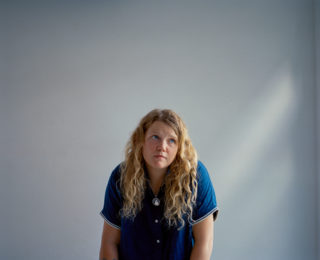
Although her work is mostly celebrated now, there’s still a tendency in some quarters to view Tempest’s output with suspicion or snobbery. She tells me that certain literary characters still wrinkle their noses at her and ask, ‘oh, so you like rap.’ As if it were a dirty, alien, dangerous genre. There’s racism there, maybe (perhaps it is difficult for leading literary figures to respect a form that emerged from a black subcultural movement). Classism, for sure. She rolls her eyes, “Suddenly you’re responsible for their ignorance.” But fitting in has never been the point of it, really, and still isn’t, despite the discomfort she feels in some of the art world’s more elitist spaces.
“It’s like, in my experience of moving into poetry, and even some of the spaces where these events would be happening, at the time I was freaked out. And I’d be calling my pals like, ‘I’m at another poetry gig in a gallery.’ And I felt hideous and ugly and I didn’t know where to put my feet. And I couldn’t speak and I didn’t know how to make eye contact in the right way. And there is this thing, like you feel that you don’t belong, that you’re not allowed. But what you get from the work…’ She stops, leans back to take in the span of the sky. “What you get from the work, nobody can give you permission for that. Because, yeah, everything about it made me feel like I didn’t belong – except the art work itself.”